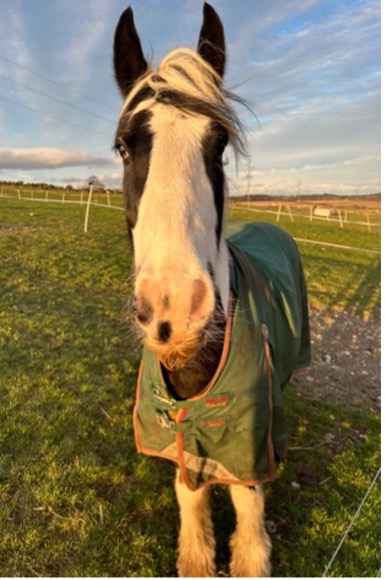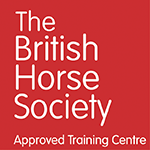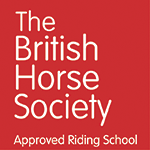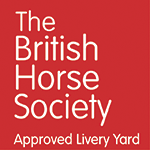
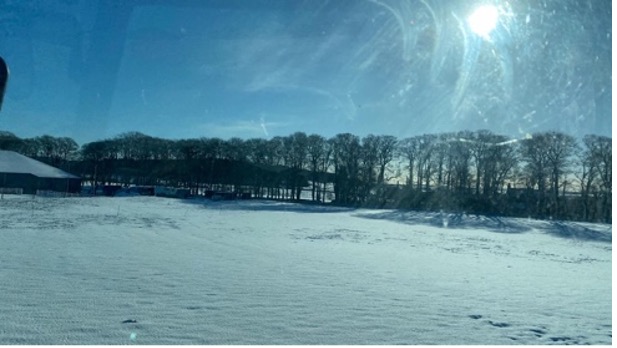
Well, it was certainly very beautiful in the snow at ARC in February – but a bit cold and a bit of a pest trying to clear it and get horses in for lessons! As always, a big thank you to our members who were so understanding when we had to cancel some Saturday lessons to allow us time to salt/grit the walkways and make sure the centre was safe for our horses and ponies to be led around in and our members to visit – it was much appreciated! Between storms, power cuts, Covid and snow we’ve certainly kept being tested in early 2022!
PONY STARS
Our “intensive” Pony Stars sessions (which include a riding lesson) in the Easter holidays are now all full, but we still have space in the “stable management only” sections. These are ideal for younger members who are looking to build their confidence handling/grooming e.t.c. and also count as stable management sessions to be marked off at their annual assessment for ribbons.
We are running “beginner” sessions from 10a.m – 12p.m on Mon 4th April – Thurs 7th April – these sessions are £20 per day and will be covering the initial content of the “Dartmoor Dazzler” Pony Stars.
We are running “novice” sessions from 10a.m – 12p.m on Mon 11th April – Thurs 14th April inclusive and these sessions are designed for those who have done some Pony Stars already and are nearing the end of “Dartmoor Dazzlers” and looking to progress onto “Welshie Wizzers”. Again, these sessions are £20 per day.
For the shorter stable management sessions from 10 – 12, you can book your younger rider into as many or as few days as you like so they can attend the whole week, or just one or two days – whatever suits – this is the point of this option in that it gives more flexibility for members who have other activities in Easter holidays but still want a bit of pony time 😊
SCHOOLING WHIPS vs SHORT CROPS
We’ve been asked quite a bit lately about which type of stick is best for your riding and the answer is dependent on your standard and what activity you are doing in your lesson. So, we thought best to give a bit of a description of the use of these so that people could decide which (or both) they needed:
Schooling whip – a schooling whip is a longer stick, normally with a tassle on the end. It is designed for doing flatwork, for riders who are capable of keeping their hands still in trot and canter. The idea is that if you need to back up a leg aid, you can give the horse a tickle behind your leg without taking your hand off the rein (because of length of stick) which is really important when trying to keep a nice balanced position. A schooling whip should never be used to “hit” a horse with – imagine using it so it feels to the horse like a fly has landed behind your leg.
Short stick – these are normally used for jumping, but also for more novice riders who are still working on having nice still hands. The shorter stick is better for jumping as when you fold/give the reins over a fence it won’t end up tickling the horse by mistake (a schooling stick will). If you need to use a short stick to back up a leg aid, then you should put the reins in one hand and use it lightly behind your leg – we put the reins in one hand because the stick is shorter, so you won’t pull back on the rein by mistake when you use it if you don’t have hold of the rein in that stick hand. They are also good for more novice riders, who can give the horse a tickle on the shoulder rather than having to take their hand off the reins – it’s really important that beginner/novice riders don’t learn to kick/wave their legs about – both because the ponies won’t like it, but we also want them to develop a good secure leg position.
Most riders once they have reached a level that they are doing lateral work e.t.c. tend to have two sticks (a short and long one) and then select which one they need to use that week depending on whether they are doing flat or jump.
MARCH TRAINING
We are continuing to do our weekly training in March and as always, sessions are available to attend in person, or via Starleaf video call or you can also request a recording. All training sessions are £15 so if you’d like to book in for them, then email Ali at lessons@aberdeenridingclub.com and let her know how you are attending or if you’d like a recording.
Saturday 5th March (4.30p.m) – conformation and how it affects training/ridden work – we will have a group of horses in the school to assess their conformation and then put their riders on and discuss how we work with the horses individually to suit their conformation.
Friday 11th March (5.30p.m) (free of charge)– Equine careers talk – Sally will present on the career pathway (BHS) and links with SRUC course that we deliver practical aspects of. Great opportunity for anyone who is thinking of gaining some equestrian qualifications (whether you are interested in a career with horses or you are a recreational rider).
Saturday 12th March (4.30p.m) – dog legs and related distances – how to walk them/ride them and use them to improve you and your horses jumping.
Saturday 19th March (4.30p.m) – horse psychology. How horses behave in the wild, how we try to replicate that in our management and how to “talk horse” J
(This may explain the “magic” that seems to happen when our coaches ride your horse or handle your horse).
Friday 25th March (5.30p.m) – Equine business management – how to get customer feedback/input and ensure you are delivering exactly what your customers want.
MASKS
As you will have noticed, the requirement for wearing masks in indoor spaces is being removed during March. Our policy at ARC will change at that point in that we will no longer require masks to be worn in the coffee area but will be keeping the rule of 1 visitor in reception at any one time.
Our view remains that whatever makes our members comfortable is good with us – so we are happy for members still to wear masks if they prefer (both riding and in coffee area e.t.c.) so do please just feel comfortable to do what suits you.
WELCOME DEESIDE
We are delighted to be welcoming a new RDA group (Deeside RDA) to use our facility and ponies on a Thursday early morning. Deeside haven’t been able to provide sessions since before Covid and during it they lost their facility and coach, so we were asked to step in and help and we are providing them with the ponies and arena and Valerie Cooper is going to coach for them, so it’s a great use of the facility to make our horses even more accessible.
THE STORY OF FREDDIE
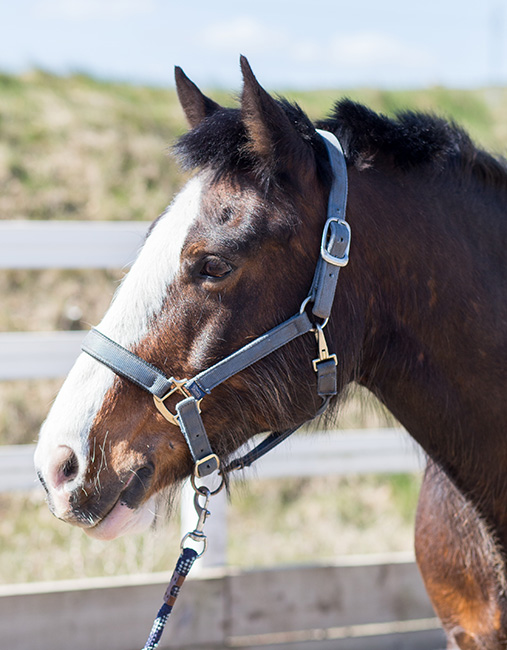
Freddie has been with us since 2007 when we bought him as a 5 year old so he is now around 20 years old. Sally bought him unseen from a dealer who she used to buy quite a lot of school horses from in Carlisle and he was exactly as described – a smart mini cob that was quite green.
Freddie did quite a bit of training before joining the riding school – working with our coaches at the time to get a bit more experience on the flat.
Freddie then joined the riding school and did a variety of adult and junior lessons. As a young horse, he could be quite spooky, but in a nice way – he never did anything nasty, just funny 😊
Freddie did a lot of dressage early on – he was one of the horses that we used for the university competitions so worked at BD Novice level and always got good solid scores with the riders. He has always had a very light mouth and isn’t a fan of anyone using too many rein aids, or too strong a rein aid and he is much more forward with riders who have nice elastic arms.
Freddie had around a year off work in 2013 – he went lame on his right fore and the reason for it has always remained a mystery – his feet were normal on x-ray, he hadn’t had any history of laminitis so there wasn’t really ever a clear diagnosis – but this is often the case with some horses – there is no obvious reason for it. We always assumed he had damaged a ligament in his foot (which can’t be imaged by vet at stables) so it was treated as that. He had a bit of box rest for a few weeks, then quite a bit of field rest and we changed his shoeing to wearing Imprint shoes which definitely seemed to help. Once he was sound, we gave him a few more months off just to be sure as he was still relatively young, and he has never looked back or had issues with that foot again. He stayed in the Imprint shoes for around 5 years and moved back to standard steel shoes around 2 years ago with no issues. The Imprint shoes are expensive (£180 for a pair) as they take a lot of time and skill to put on as they are glue on shoes (as opposed to nailed on) but our view is always the same – far better to spend money on the shoeing so the pony is comfortable.
As he has gotten older, Freddie has started to do more really valuable work with our therapy riders and with the ARC Hippotherapy group – he is brilliant with these riders as he is so friendly and gentle and he loves going for a walk up the track on a nice day J He has gotten more determined on how he likes being ridden in his old age – he isn’t a fan of riders kicking or nagging with their leg – he prefers a much more subtle leg aid and if you are struggling to get Freddie to go forward, a light seat is a good option for canter. He is also an “expert” lunger so has been doing a lot of work in last couple of years training career professionals in their lunging areas for BHS assessments and is also a real asset to the SRUC students who use him for a lot of their lunge training – he is the master of working out how competent someone is lunging – if you are a bit nervous/getting your equipment in a muddle he walks round like he’s been sedated 😊 But if you are competent and doing everything right he goes like a wee bullet so he does every standard of lunging from Stage 2 to Stage 4.


